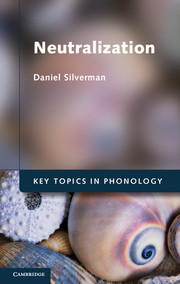Book contents
- Frontmatter
- Contents
- List of Figures
- Preface
- Acknowledgments
- 1 The rhyme and the reason of neutralization
- Part I Rhyme
- Section A Observation and description
- Section B False positives
- Section C Explanation
- 7 Ease of production
- 8 Ease of perception
- 9 Phonetic misperception
- 10 Semantic misperception: early proposals
- 11 Semantic misperception: recent proposals
- Section D Exemplification
- Part II Reason
- Glossary
- References
- Language index
- Subject index
7 - Ease of production
Published online by Cambridge University Press: 05 November 2012
- Frontmatter
- Contents
- List of Figures
- Preface
- Acknowledgments
- 1 The rhyme and the reason of neutralization
- Part I Rhyme
- Section A Observation and description
- Section B False positives
- Section C Explanation
- 7 Ease of production
- 8 Ease of perception
- 9 Phonetic misperception
- 10 Semantic misperception: early proposals
- 11 Semantic misperception: recent proposals
- Section D Exemplification
- Part II Reason
- Glossary
- References
- Language index
- Subject index
Summary
Speaker-based approaches to neutralization that reference “ease of production” have often been mentioned in passing in the phonological literature, though have rarely been pursued with much rigor (one exception being Kirchner 1998, 2004), perhaps because even a rather superficial thinking-through of any potential arguments in their favor leads to patently false predictions.
Proponents of this general approach typically invoke intuitively appealing references to speaker “laziness”, “energy conservation”, “articulatory anticipation”, or “articulatory undershoot” in their accounts of neutralization that derive from assimilation and/or gestural reduction. As we'll see, it's one thing to propose that speakers – and, by extension, phonological patterns – are, at some level, partially influenced by general movement constraints such that, over long periods of use, phonological systems may bear the mark of such limitations. It is quite another, however, to propose that speakers' physical prowess is taxed in ways that have an on-line influence on their speech patterns, such that these speakers habitually ease their articulatory burden, or anticipate a following speech gesture, or undershoot some proposed articulatory target. As I write in my 2006 book, in the context of the topic of neutralization deriving from anticipatory assimilation: “. . . [T]he sound substitutions that we observe can probably never be reduced to such one-dimensional, proximate influences on speech, articulatory or otherwise; we observe articulatory anticipation in the present state of the language, but this doesn't mean that the pattern has its origins in present-day articulatory forces” (2006a:66).
- Type
- Chapter
- Information
- Neutralization , pp. 78 - 85Publisher: Cambridge University PressPrint publication year: 2012

